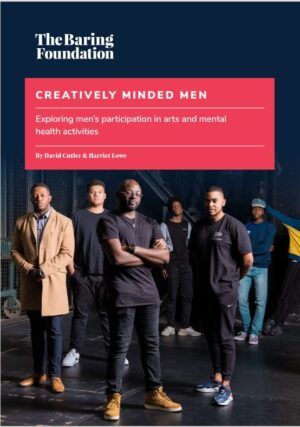In March we launched our new report on engaging men with mental health problems in creative activities – Creatively Minded Men. In it we concluded that research about the degree to which men participated was scarce, but what was clear was that they could benefit from taking part in the arts and that the workforce involved in this area of the arts (and in some relevant professions such as therapy) was overwhelmingly female.
So, we decided to further explore this issue by launching an accompanying fund for arts organisations of £1 million, offering grants of up to £50k to arts organisations to improve the rates of male participation in inclusive arts activities or to offer men-only sessions. This resulted in the largest number of applications we have ever received for an open Arts round – 193 bids.
Two interesting issues emerged from the applications. Firstly, many applicants mentioned very low current rates of male participation in inclusive arts projects. 10%-25% was not unusual. Secondly, almost no applicants chose to try to improve rates of participation within mixed gender groups but instead chose to apply for funding for men-only groups.
Although the high rate of applications is of course a sign of enthusiasm for working on this issue – and the funding pressures in the arts sector in general – it always worries us that we need to turn down so many good applications. We want to be as fair as possible and so we adhere strictly to assessing all applications against the criteria we have published. Two staff members and two expert advisers look independently at all applications and then come together as a panel to reach a consensus on which applications to recommend to a Committee of Foundation trustees for funding. It is important to emphasise that in many cases these judgements are comparative. An application we don’t fund may meet some or all the criteria, but less well than others in our judgement.
There were so many strong applications in this round that we increased the funding we made available by over £400k (which of course means that we will have less to spend on other work this year). Trustees have now agreed to make 32 grants. We are very sorry indeed not to have been able to offer more awards, but we simply don’t have enough resources. We are deeply grateful for all the hard work that went into these applications and hope that some of them might become possible in the future.
Given that there is obviously so much interest around this issue, it’s important that we make the best possible use of the grants that we have made. Therefore we are inviting all our successful grant partners to form a community of practice. We will be publishing blogs about what works along the way. Finally, we plan to publish a report and hold a major, free in-person conference when most of the grants have completed to showcase the work.
We started this journey with some trepidation. Was the participation of men in creative mental health really a neglected area and one that ought to have more priority? We now feel much more confident that this is the case and will try to support the development of this area as best we can.
